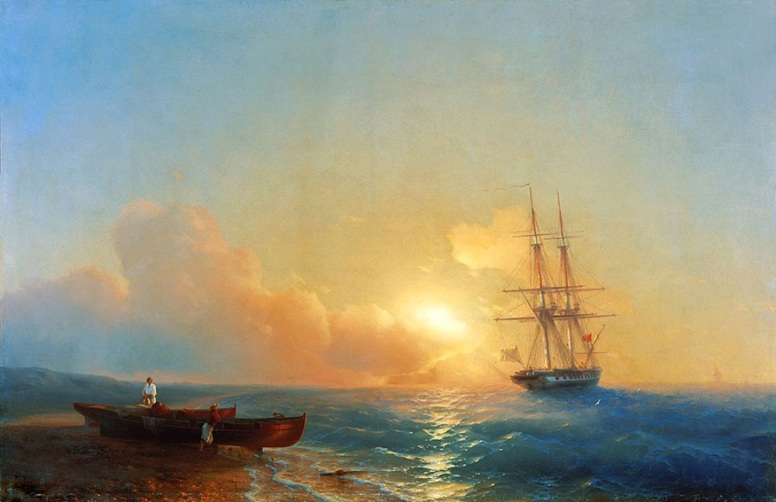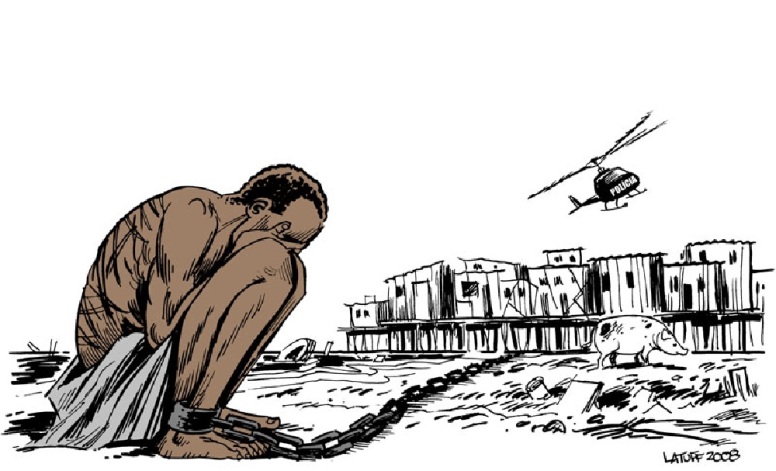Recent Updates
Killed Albatross

Ivan Aivazovsky – Fishermen Returning Near Naples (1874)
When among the trees the wind had turned to the sea
And in the velvet of the shadow the sand was damp,
A wave pulled it out and carefully placed it
On a bright shell cemetery.
.
At the edge of the boiling sea life
It stands unusually rigid, lofty but slain,
Like he still looks at the billows of the horizon,
With its wistful neck bent up.
.
Dirty and salty are its open wings,
The striking storm sings its a deaf burial,
Killed shells gleam around it,
Whose cores are borne by warm.
.
Thrown by waves on the dry and hard shore
They died without a fight, glittering rich now.
Their white light shining was disturbed
By its wing covered by stifled mud.
.
A seagull screams above in the air
Dancing in abrupt jumps defying the boundlessness.
The storm warrior thrown between the mollusks
Blinks in its faded eye a new ascent.
.
When the breeze grows, its wing gets thrilled
And, resurrected for a moment by an unseen impulse,
Looks like it will fly again, last time,
To a more sober and dignified cemetery.
Nicolae Labis, Killed Albatross
NIRVANA – The Man Who Sold the World
Morality and Atheism

Existentialist atheism states that if God does not exist, then there is at least one being whose existence precedes the essence, a being that exists before being defined by any concept, and that being is man…
What is meant here by the statement that existence precedes the essence? This means that man first exists, is located, emerges in the world and then is defined. As conceived by existentialists, man is undefined because in the beginning he is still nothing. But then he will be something, and he will be what he becomes by himself. In this way there is no human nature, because there is no God who can conceive of it.
Dostoevsky wrote: “If God does not exist, then everything is permitted”. This is the starting point of existentialism. Indeed, everything is permissible if God does not exist, and consequently man is abandoned because he finds nothing in himself or outside him any possibility for him to hold on. He can no longer find excuses.
If indeed existence precedes the essence, we will never be able to explain something by reference to a given or fixed nature. Therefore, there is no determinism: man is free, man is freedom. On the hand, if God does not exist, we do not find any value that would legitimize our behavior. Today, neither behind us, nor in front of us, in the luminous field of values we have no excuses or justifications. We are alone, without any excuse.
If we suppressed God, then someone must invent the values. Things need to be taken as they are. And, besides, to say we invent values means that life does not have a defined meaning beforehand. Before you live, life is nothing. But you are the one who gives meaning, and the values are nothing more than the meaning you choose…
J. P. Sartre, Existentialism Is a Humanism
NATHALIE CARDONE – Hasta siempre
HEMINGWAY – The Man and the Society

Ernest Miller Hemingway (1898-1961), the great realist of twentieth century American fiction was born in Chicago, Illinois, on July 21, 1898. After he graduated from high school there followed a brief period when tried his hand as a day laborer, a sparring-partner, and a reporter. At the age of nineteen he went to Italy as an honorary lieutenant in the Red Cross, with a volunteer American ambulance unit, and was severely wounded on the Italian front in 1918. After the armistice he returned to America where he worked for a while in Canada for the Toronto Star but finding himself unhappy with America, he took off to Paris as a foreign correspondent for the same Toronto Star.
Hemingway’s first book, In Our Time (1924), is a collection of stories. Nick Adams, the central figure, appears in seven of the stories and is a sort of alter ego for the young Hemingway. This honest, sensitive boy forever been registered in the youth’s memory, shaping his future physiognomy. And as ill luck would have it, these psychos injuries are finally enhanced by a physical wound Nick gets while in the war – a fact which culminates the former wounds he has been given as a growing boy.
In the same crippling wound Nick’s duplicates will get (Jack in The Sun Also Rises, Frederic Henry in A Farewell to Arms, Cantwill in Across the River and Into the Trees) and which will make the Hamingway’s protagonists break with the society which has caused him suffering and, eventually, to become an expatriate.
What is important to understand at this point is the fact that Nick, though under other names and in other books, is going to be known as the ‘Hemingway hero” – a consistent character who exemplifies certain principles of honor, courage, and endurance which enable him to conduct himself well in the battle of life.
Two years after the publication of his first book, Hemingway issued his first important novel, The Sun Also Rises (1926), the action of which is set in a period of post-war isolation and moral confusion.
The belief that people while trying to create their lives are caught up by events is once more present in Hemingway’s next book. A Farewell to Arms (1929), a distinguished war novel based on his service in Italy. It describes the whole panorama of civilization by war, disjointed exposing the evils of war. Another important thing the book does is to explain how the characters of The Sun Also Rises got the way they are and therefore the two novels are to be considered as complementary to each other.
Hemingway’s enthusiasm for the international brigades which were fighting a crusade for human liberty in the 1930’s induce to write his best and longest novel, For Whom the Bell Tolls (1940), built on an incident during the Spanish Civil War. The author gives the action a universal significance by showing that the loss of liberty in once place means a loss everywhere.
 After the publication of this war novel Hemingway lapsed into a silence that lasted a whole decade.
After the publication of this war novel Hemingway lapsed into a silence that lasted a whole decade.
The Old Man and the Sea which appeared in 1952 was unanimously acclaimed as Hemingway’s literature triumph. It is the tragic tale of an aged Cuban fisherman’s battle with a marlin which, through the extended metaphor of a man’s struggle with the natural world, is a parable of man’s life.
SOURCE: Virgiliu Stefanescu-Draganesti, Ernest Hemingway
HAIR – Let the Sunshine in
The Welfare and the Misery

George Bernard Shaw (1856-1950) was born in Dublin, the capital of Ireland, which was then under British rule. His father was a small employee and he had a very limited income he could not keep his son long at school. Shaw left school at the age of fourteen and at the age of fifteen he had to become an office worker to earn his livelihood. His mother divorced her husband and went to London, where – having a beautiful voice – she started giving concerts and teaching music. At the age of twenty Shaw also went to London, where he lived in poverty and struggling hard to find his way in life. He lived on a very small income which his father sent him – his mother could hardly make both ends meet – and studied all day long in the library of the British Museum, which helped him get a thorough knowledge of literature and culture in general.
There he also studied Karl Marx’s Capital and the works of well-known economists. He became attached to the Socialist movement and a member of the Fabian Society, which was founded in 1884 and for which he wrote the Manifesto or declaration of principles.
Very soon he succeeded in revealing himself to the British public as an immensely energetic journalist, critic, publicist, novelist, and reformer.
Shaw began his literary career by writing novels. But it was in the drama that Shaw found the congenital medium for the dissemination of his ideas. He popularized dramatic criticism with his Quintessence of Ibsenism (1891), in which he presented the Norwegian dramatist as as the exponent of a new genre – the “social plays” – and by articles in the periodical reviews. At the same time he sent the example of how a play should be written writing himself such plays as Widower’s Houses (1892) and Mrs. Warren’s Profession, which dealt with social evils.
His first three plays from a cycle which he called Plays Unpleasant because they revealed unpleasant things connected with the ruling classes. In them, he shows that the welfare of the respectable middle classes is based on the misery of the poor population.
Because of the great scandal his first plays caused, Shaw changed the tone of his later ones and wrote the cycle which he entitled The four Pleasant Plays (1894-1895).
Of these Arms of the Man and The Man of Destiny deserve special mention. In them Shaw endeavors the wipe out the romantic aura with which middle-class militarists try to surround war and historical military figures. Thus he tells us that the genius of Napoleon lies in having discovered that with the help of cannons more men can be killed than with the usual rifles and bayonets.
In Major Barbara Shaw’s criticism of the capitalist system reaches its culminating point. Undershaft, the ammunition manufacturer, is the ruler of England and the cynicism with which he confesses how he holds the government, the political people, the press and the police in his hands and at his orders is most characteristic of all unscrupulous exploiters. In power of thought and brilliance of style never surpassed Major Barbara which has come to be considered as his masterpiece.
Shaw saw in the drama a vehicle for presenting in entertaining and provocative form his criticism of the abuses and contradictions of the social order of his time and his suggestions of the true way in which to view life and social institutions.
As a supporter of socialist ideas, he disapproved of the institutions of the society in which he lived.
He took great pleasure in ridiculing, upsetting, scandalizing his public, for his object was to satirize, not the invented characters in the plays, but the audience. In this connection he himself tells us:

G.B. Shaw
“I must warn my readers that my attacks are directed against themselves, not against my stage figures,” because these readers, the audiences, the public, tolerated the state of affairs against Shaw rose.
Shaw regarded himself as primarily and antiromantic. The romantic view, he claimed, got in the way of people’s seeing what really went on in the world, with the result that it made them accept the most appalling horrors only because the society in which they lived was educated to approve them. To “romantic morality”, he opposed “natural morality”.
SOURCE: V. Stefanescu-Draganesti, George Bernard Shaw
